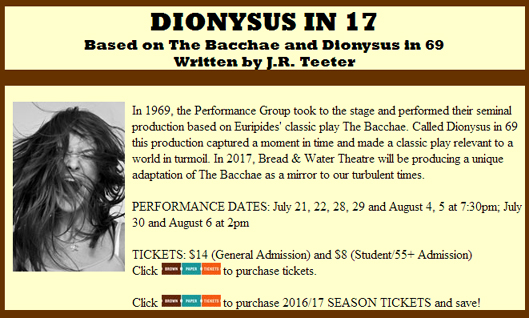IMMERSIVE, INTIMATE STAGING INFORMED BY EXPERIMENTAL 'DIONYSUS IN '69', CHANNELS TRUMP

Bread & Water Theatre in Rochester, New York, is producing a modern take on The Performance Group's Dionysus In '69, called Dionysus In '17, continuing through August 6th. The theatre's website description reads: "In 1969 [actually, it was 1968], the Performance Group took to the stage and performed their seminal production based on Euripides' classic play The Bacchae. Called Dionysus in 69 this production captured a moment in time and made a classic play relevant to a world in turmoil. In 2017, Bread & Water Theatre will be producing a unique adaptation of The Bacchae as a mirror to our turbulent times."
Rochester City Newspaper's Daniel J. Kushner reviewed last Friday's performance:
Perhaps the less you know going into a performance of Bread and Water Theatre's "Dionysus in '17," the better. Written and staged by the company's artistic director, J.R. Teeter, it should at least be said that the performance art-driven play is a modern update of "The Bacchae," by the Greek tragedian Euripides, filtered through The Performance Group's important, experimental production "Dionysus in '69." Director Brian De Palma also filmed that production for a 1970 movie.Beyond that, however, prior knowledge of Euripides's plot details or the erotically charged 1969 version may prove to be a distraction from the immersive world to which Teeter and company beckon you.
In Bread and Water Theatre's intimate black box space, the likelihood of interacting with the cast is high. A bacchant, or worshipper of Dionysus, may warn you of the god's impending arrival before inviting you to honor him by joining the ritualistic dance. Or you may be seduced into worship by Dionysus himself.
But just who is this particular Dionysus? From the outset, the line between abstracted, classical Greek myth and real-life, flesh-and-blood Andreas Gabriel Woerner -- the actor playing the chaos-causing Dionysus -- was intentionally unclear. According to Woerner, he discovered he was the god incarnate when an obese man told him so while traveling on the airplane that brought him to America.
While telling this fascinatingly dubious origin story, the Woerner settled into the role of Dionysus with smoldering intensity and vain swagger. Woerner stalked around the theater with the dangerous charisma of a cult leader. Promising freedom, his Dionysus was fittingly fickle, demanding, and hot-headed.
Fully committed, the spirited ensemble cast responded with free-flowing sensuality and latent violence, as evidenced by the tragic end of Pentheus (played by Xavier Hucks), who acted in defiance of Dionysus. As Agave, Pentheus's mother, Nicole Iaquinto gave one of the more impressive performances in the play, communicating with earnest passion the unbridled agony and desperation that are at the heart of Euripides's original tragedy.
In a somewhat disjointed turn toward the end of the play, Teeter ripped the action from safe, distant confines and transplanted them into our frightening contemporary American political landscape. Woerner suddenly began to appropriate the language of our current president, becoming increasingly unhinged as he accused audience members of worshipping him insufficiently -- a lack of loyalty, if you will -- encouraged his followers to punch people in the face, spat out venomous charges of "loser" and "crooked Agave," and talked of pussy-grabbing.
This channeling of Donald Trump was much more overt than William Finley's original evocation of Richard Nixon in 1969. But in 2017, the parallels between Trump and Dionysus are decidedly more striking -- both figures inspire a kind of blind, crazed fealty in his supporters, while promising a paradigm shift that, in some cases, enable bizarre and unstable behavior. An odd comparison, for sure, but it worked.
"Dionysus in '17" follows the swiftly paced structural framework, fundamental plot devices, and avant-garde affectations of "Dionysus in '69," but with updated language (read: plenty of f-bombs) and comparatively tamer sexual elements. This is absolutely not a play meant for children, but it may be an excellent way to start a conversation with your mature-minded teenagers about the intersections of art, politics, and sex. Teeter and his band of actors have created a highly engaging, no-frills production that succeeds in saying something the 1969 version could not.



